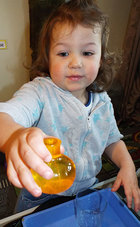
Fundamental to the success of nurseries, children’s centres and schools that were successful in this was a strong understanding of maths and maths teaching and learning. Settings that were bringing maths into all activities, and adapting the learning environment so that it became numeracy-focussed were also successful.
These settings were also developing the concept of ‘number’, and encouraging children to understand the concept of ‘fourness’, as well as helping to build confidence in practitioners through focussed continuing professional development (CPD). Settings that provided time for staff to plan together and ensured that children received immediate feedback were also positively impacting this gap.
The paper comes from the Fair Education Alliance (FEA) numeracy group, and was co-chaired by the Achievement for All educational charity and accountancy company KPMG.
It finds that a whole school or setting approach to teaching maths produces a far more positive outcome, especially in under-privileged children.
Teaching maths through ‘real-life’ context was also instrumental to positive maths engagement. Settings that monitored and assessed their children closely also found a heightened positive response to maths.
The report underlines the value of the work of maths leaders, managers and practitioners. They help to develop maths in education, and have also made it more accessible to teachers, parents, carers and other staff.
Sonia Blandford, chief executive of Achievement for All, told Nursery World that an understanding and confidence in maths skills at a practitioner level was also extremely important. She said, ‘The notion of “I can’t do maths” and this previous culture of self-consciousness has meant that settings haven’t changed with maths. There is an acceptance that lacking maths skills is “OK”, and this is what urgently needs to be changed.’
She added, ‘The whole setting approach is all about the leadership. It’s a collaborative method centred around basic numeracy skills, and through understanding numbers at all levels, children will reach a point of school readiness. Trained professionals need to have a positive outlook towards maths, and this comes in building up the confidence of practitioners, teachers, parents and carers.’
The report acknowledges that children from disadvantaged socio-economic backgrounds are more likely to underachieve in maths throughout school life, and reveals that primary schools and early years settings that teach maths using this ‘whole school or setting approach’ are most successful at breaking this trend, which affects settings from all backgrounds.
The report also underlines the early years settings and primary schools that are getting it right and delivering high quality education, irrespective of the child’s social or economic background. It focuses on settings from more deprived neighbourhoods as well as more affluent areas, giving a balanced cross-section of early years settings in the UK.
Ms Blandford added, ‘The eight-year gap that exists between the highest and lowest performing students in England is very profound, and sadly that gap is never made up again.
Functional skill is therefore important and at the moment it’s not accessible to everybody.’
She continued, ‘For policy makers, the report provides training for practitioners and their understanding of numeracy concepts and how to teach it.’
This can be applied at various levels in education. It also suggests that in order to close the gap in maths attainment, early years settings must learn from the examined case studies.
 One early years provider that was found to be practising maths engagement in a positive way is childminder Charlotte Greeno, from Cambridge, who has adapted pedagogy so that maths is learnt through play.
One early years provider that was found to be practising maths engagement in a positive way is childminder Charlotte Greeno, from Cambridge, who has adapted pedagogy so that maths is learnt through play.
Using resources such as play-dough, cooking, self-service at meal times and tally charts, focus remains on numbers and problem solving. Ms Greeno makes effort to observe the children in her care once a week, and observations are recorded on an electronic learning journey system. This works alongside the EYFS and Development Matters.
For Ms Greeno, ‘Making maths as real as we can and giving them the chance to do it themselves [means] letting them make the mistake and then work it out, rather than telling them it’s right or wrong.’
Also featured in the report is Little Owls Nursery in Scunthorpe, where ‘the setting aims to involve all children every day. [There was] a big focus to the physical environment and how maths can feature everywhere. There are shapes around the room, on the floor, on walls, etc. To stimulate children, a member of staff might say “find a circle”.’
Despite being situated in one of the 10 per cent most deprived neighbourhoods in the country, the manager’s Maths Champion training from NDNA has helped the nursery’s approach to maths greatly. Since this training, many changes to maths practice were made through reflection and evaluation. Now there exists a ‘big focus on number and measuring is a daily activity’, where maths is encouraged as a fun exercise.
According to Little Owls, they have tailored pedagogy to each child’s needs. ‘Knowing the children enables us to find something they can do. It might be a game and it gives them confidence. Each time they can do a bit more and grow in confidence.’
The research concludes that early years settings should focus more on the continued development of adult and child interactions to help integrate maths into daily activities. Areas that also need work include transition development, monitoring of teaching, learning through data and keeping maths fun.
- A half-day Masterclass 'Early Maths: No Problem?' will run on Friday 5 May at Nursery World North in Liverpool. Anne O'Connor, Linda Pound and Tom Weaver will explain why children have to ‘do’ maths – using their bodies and their minds – and how in the right rich and supportive enabling environment, they can sidestep ‘maths anxiety’ to become part of a generation of confident maths learners. Book tickets here.









